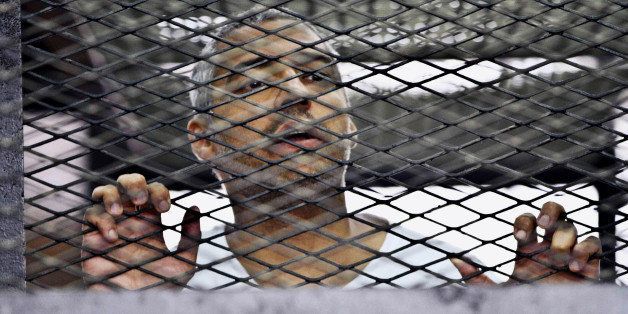ISTANBUL — Egyptian authorities have blood on their hands, Human Rights Watch said in a damning report published Wednesday that detailed scores of detainees dying and wasting away while in government custody.
Most of those imprisoned are members and supporters of the now-banned Muslim Brotherhood, an estimated tens of thousands of whom have been jailed since Egypt’s military ousted controversial President Mohammed Morsi and took control of the government in July 2013. Academics, liberal and secular activists, Egyptian and foreign journalists and members of rights groups have also been targeted and jailed.
“The Egyptian authorities have appeared shockingly complacent in the face of so many detainee deaths,” Human Rights Watch Middle East and North Africa Director Sarah Leah Whitson said in the report. “They need to ensure that all such deaths, as well as abuse allegations, are independently investigated, and rapidly put in place and enforce effective safeguards to protect everyone in state custody.”
Despite Egypt’s constitution banning torture and abuse of detainees, the practice is widespread. Last year, a guard at one Egyptian police station in Alexandria proudly showed this reporter bloody handprints on the wall and a belt used to whip detainees.
According to the Cairo-based Nadeem Center for the Rehabilitation of Victims of Violence, at least 35 people died in the first 100 days that President Abdel-Fattah el-Sissi, a former military general, controlled the country.
El-Sisi, who maintains a strong support base in Egypt, has promised to restore security in the country, where terrorist attacks on security forces are now commonplace. His administration has labeled the Muslim Brotherhood as a terrorist organization, jailing people who even hint at supporting the group. Many rights organizations and critics insist that the security crackdown violates basic freedoms and human rights.
Four years after the Egyptian revolution that captured the world’s attention, protesting is now illegal without prior approval from security forces.
Many detainees do not receive fair trials or proper legal proceedings, as in the case of the three Al Jazeera journalists imprisoned in December 2013 on terrorism-related charges and later sentenced to seven to 10 years in prison. Many critics say the case made a mockery of the justice system.
Egyptian prosecutors have only filed a single case against police forces tied to the deaths of detainees since the spring of 2013, according to Human Rights Watch.
Egyptian news site Mada Masr reported this week that authorities arrested 14-year-old Akram al-Sawy after he said that he and other children were tortured and abused during their detainment.
There are also reports that hundreds of Egyptians are being held in secret military detention facilities.
“Officially, you aren’t there,” an Egyptian man named Ayman told The Guardian in June.
Ayman said he was brought to a secret military prison called Azouli in 2013. “It isn’t like normal prisons. There is no documentation that says you are there. If you die at Azouli, no one would know,” he told the news outlet.
In the Guardian article, former detainees described being beaten, electrocuted, stripped naked with their wrists tied and forced into confessions. Many were barred from health care and subjected to inhumane and overcrowded conditions, the Guardian reported.
This week, the family of Mohamed Soltan — the jailed 27-year-old Egyptian-American son of a prominent Muslim Brotherhood member — released graphic images showing him bruised and sickly with blood running out of his month. Soltan grew up in the Midwest and attended Ohio State University. Cairo security forces shot him in the arm in August 2013 when they cleared a mass Islamist sit-in, killing hundreds. A week and a half later, Soltan and his father were in a jail. Now, he’s on hunger strike, like many other detainees who hope such drastic measures will attract attention to their case.
360 days of hunger strike! #SaveSoltan pic.twitter.com/CNLS636a9V
— #FreeSoltan (@Free_Soltan) January 21, 2015
Another high-profile detainee, Alaa Abdel Fattah, is also on hunger strike. The secular activist, jailed on charges including breaking the harshly enforced protest law, is famous for his involvement in the 2011 revolution.
Abdel Fattah has been targeted or jailed by every regime since President Hosni Mubarak, who was ousted in 2011.




